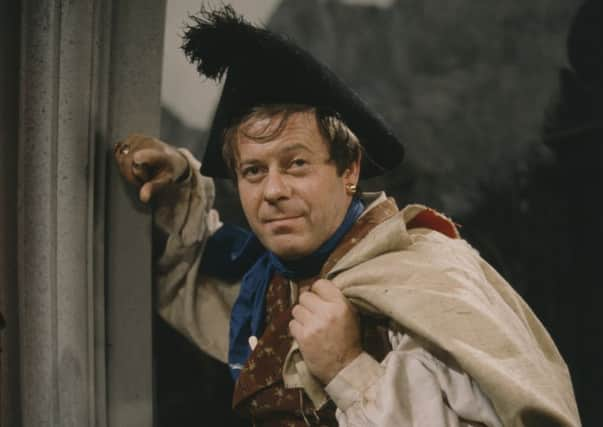Obituary: Aubrey Morris, actor


Few actors did eccentrics quite as well as Aubrey Morris, whether it was the chuckling grave-digger amused at Edward Woodward’s uptight policeman in The Wicker Man or the smiling probation officer, inviting Malcolm McDowell to join him sitting on the bed in A Clockwork Orange.
And before that there was the twitcher teasing Diana Rigg about mysteriously disappearing birdlife in The Avengers; and the judge sentencing Patrick McGoohan to death in the cult TV series The Prisoner, while dressed in the purple robes and gold laurel wreath of a Roman nobleman.
Advertisement
Hide AdAdvertisement
Hide AdMorris was never a major star, but his face would be instantly familiar to anyone who watched films and television in the 1960s and 1970s.
With a little smile forever playing on his lips and his head tilting to a slight angle, Morris could be camp and sinister at the same time. In a screen career spanning more than 60 years he appeared in well over 100 films and television shows, as well as dozens of plays, often as a villain, though sometimes the audience never knew for sure.
His stage career took him from Dundee Repertory Theatre, where he had stints as a teenager in the 1940s and again in the 1950s, to Broadway, where he appeared in several Shakespearean productions with the Old Vic, including Macbeth and Romeo and Juliet.
He always wanted to play Iago, the character who stirs up all the trouble in Shakespeare’s Othello, but he never did, at least not in the theatre.
However Morris, who was notably theatrical and un-self-conscious off screen, would suddenly adopt the persona of the character in public and start delivering his lines, seemingly unaware of any embarrassment he might be causing his companions.
One reason he was so good at playing eccentrics was that he was so much larger than life himself, though in real life he was known as sensitive and emotional, warm and friendly, rather than creepy and sinister.
He was born Aubrey Jack Steinberg, into an Orthodox Jewish family in Portsmouth in 1926. His grandparents fled the pogroms in Ukraine at the end of the 19th century. His father had been a professional entertainer in Jewish vaudeville halls in London’s East End before becoming a businessman, dealing in fruit, vegetables and jewellery.
His father taught Morris and his eight brothers and sisters songs and routines from his music hall days and his parents encouraged a wider interest in entertainment and the arts. Morris’s brother Wolfe also became a successful actor in theatre, film and television and two sisters were professional dancers.
Advertisement
Hide AdAdvertisement
Hide AdMorris acted in local productions from an early age, won a scholarship to Rada, the Royal Academy of Dramatic Art, in London, and by the 1960s was appearing regularly on television in such shows as Armchair Theatre, Z Cars, Man in a Suitcase and The Champions.
He first appeared on screen with Patrick McGoohan in the 1962 film The Quare Fellow, and they were reunited a few years later in several episodes of Danger Man and in its quasi-sequel The Prisoner. McGoohan even created a character, called Aubrey, specially for him in a film version of The Prisoner that fell through.
Although Morris rarely appeared in starring roles, he did have the distinction of being in two of the most notable cult movies of the 1970s. He was particularly sleazy as the probation officer in A Clockwork Orange, Stanley Kubrick’s dystopian futuristic drama. The film caused such a furore that Kubrick himself withdrew it from circulation.
And his performance in The Wicker Man was perfectly in tune with the film as a whole. He was seemingly good-humoured and harmless as the grave-digger and gardener, patiently explaining to Woodward about an umbilical cord hanging from a rowan tree on a new grave.
He chuckles to himself when Woodward asks where the minister lives. “Meenister,” he repeats to himself as he heads off, as if it were the most ridiculous thing he had ever heard. And there is no minister, for he is part of a community that practices human sacrifice. The film was originally released as a B-movie, but is now acknowledged as a classic.
In the 1980s Morris moved to the United States, where he again worked with McGoohan in 1998, on an episode of the detective series Columbo which McGoohan directed. Other later credits included Murder She Wrote, Tales from the Crypt, My Girl 2, Pearl, with Malcolm McDowell, and the HBO western series Deadwood.
Morris was gay and had no children, though he regularly came back to visit family in England.